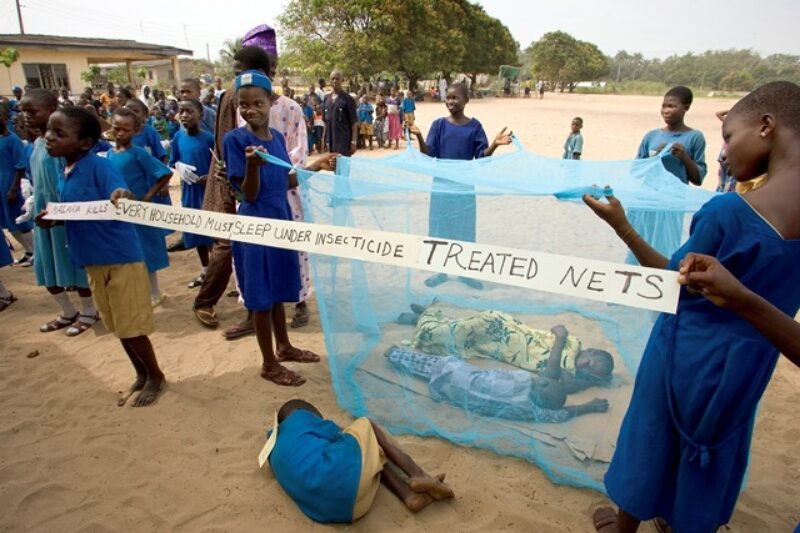Malaria is known to be the number one killer of children in Africa and it is estimated that one in four cases globally is in Nigeria – in Borno State in the northeast as many as 500 people are diagnosed with malaria every day during the rainy season.
In an effort to reduce the high number of cases of malaria, a four-day, door-to-door antimalarial drug campaign, organised by the health ministry, was launched throughout Borno State on Thursday, August 3. The long-term aim is to eliminate malaria in the state.
Malaria usually spikes during the rainy season from July to October. Although rare, healthcare workers have reported cases in the dry season as well.
Malaria is an acute febrile illness caused by Plasmodium parasites. It is spread to people through the bites of infected female Anopheles mosquitoes. It is preventable and curable. However, without prompt diagnosis and effective treatment, a case of uncomplicated malaria can progress to a severe form of the disease, which is often fatal without treatment.
Although a vaccine for malaria has been developed, it has not yet been rolled out. Instead, drugs in tablet form are used to help to eliminate the disease.
The drugs kill malaria parasites in the liver or red blood cells before they get out of control. People can still get malaria if they have taken the pills but taking them cuts the chances of getting sick by about 90%. One tablet is taken once a month for four months.
The elimination campaign began with a two-day training workshop held on Monday and Tuesday this week at the Dujuma Hotel in Maiduguri, the state’s capital.
Health professionals, state hospital staff, community healthcare workers and representatives from the World Health Organisation (WHO), the Malaria Consortium, an international non-profit organisation specialising in the comprehensive control of malaria, and the World Bank attended the workshop.
Mala Waziri, the state government’s programme director for malaria, said the aim of the workshop was to make people aware of the dangers of the disease and to encourage them to take antimalarial drugs. More than 15,000 community healthcare workers from the 27 local government areas were trained on how to inform people about malaria and how and when they should take the drugs.
Both Waziri and Dr Zara Mohammed from the Mamman Shuwa Memorial Hospital said that in Borno State as many as 500 people were diagnosed with malaria every day during the rainy season.
Waziri said pregnant women and children of five years and under were more at risk of becoming seriously ill and could die if bitten and not treated. People with HIV/Aids were also at a higher risk.
“We started with an awareness campaign on the dangers of malaria. We wanted to allay fears people might have of taking the tablets so that they would cooperate with healthcare workers. People are often doubtful and do not trust things they don’t know about. Because of that, some will not allow healthcare workers into their homes and will not let their children be given the drugs.
“We want to ensure that we reach as many pregnant women and children of five years and under as we can. We will also distribute malaria nets to households. The campaign will run until Sunday, August 6.”
Waziri said there were more than 100,000 cases of malaria in the state last year. He did not disclose the number of deaths.
He said the campaign would run in all 27 local government areas and healthcare workers would even try to get to remote parts that were hard to reach. The target was to reach 2.3 million people.
He called on parents to stay at home during the four-day campaign to ensure the healthcare workers would have access to their children.
He advised residents to keep their environment as clean as possible and to avoid stagnant water where mosquitoes were known to breed.
“Residents of internally displaced persons’ camps are vulnerable because their living conditions are overcrowded and usually sanitation is poor. During the rainy season there are many muddy puddles where children like to play. Parents are advised to keep an eye on their children,” Waziri said.
The WHO said other vulnerable groups included migrants, mobile populations and travellers who entered areas with intense malaria transmission and who had not acquired partial immunity from long exposure to the disease, or who were not taking chemo-preventive therapies.
It said that nearly half of the world’s population was at risk of malaria. In 2021, an estimated 247 million people contracted malaria in 85 countries. That same year, the disease claimed about 619 000 lives.
FALMATA MOHAMMED ALI









